I had been in Budapest for a week at this point (the “s” is pronounced “sh” in Hungary, by the way, so pronounce it “Budapesht” if you want to sound local). My first week on my completely solo long-term trip abroad. Me, my backpack, and my one-way ticket. I somehow wasn’t nervous at all, and I found so many things to love about the city. What I loved most was not the beautiful buildings or the Danube River – it was the readers. From the public park benches to the trams, so many people had books! Even the sidewalks had red carts filled with secondhand books anyone could browse through. I felt right at home with my beat-up copy of Shantaram tucked under my arm. My Hungarian journey had just begun…
I feel as if you haven’t truly visited a country if you just see the capital city, so I decided to do my first workaway experience in the southern Hungarian plains at a remote farmhouse called a Tanya. If you don’t know, a workaway is an opportunity for backpackers to work a few hours a day in exchange for food and accommodation. And, if you don’t know, a Tanya is a specific type of rural homestead, mostly found in Hungary. I hopped on the train and rode three hours out of Budapest to meet with my host couple (from the Netherlands, but had recently moved to Hungary), who I’d only had a few conversations with via WhatsApp. Of course, now, I’m feeling all of the feelings – nervous, hesitant, sweaty (summer time is so hot out there…I mean, it’s a desert), curious, and above all…magical. I looked for them on the train platform and recognized them from the few pictures I’d seen. They greeted me so warmly, with hugs and cheek kisses – this is the Dutch way. They drove me 40 minutes out into the plains, right outside of a small village called Ruzsa.
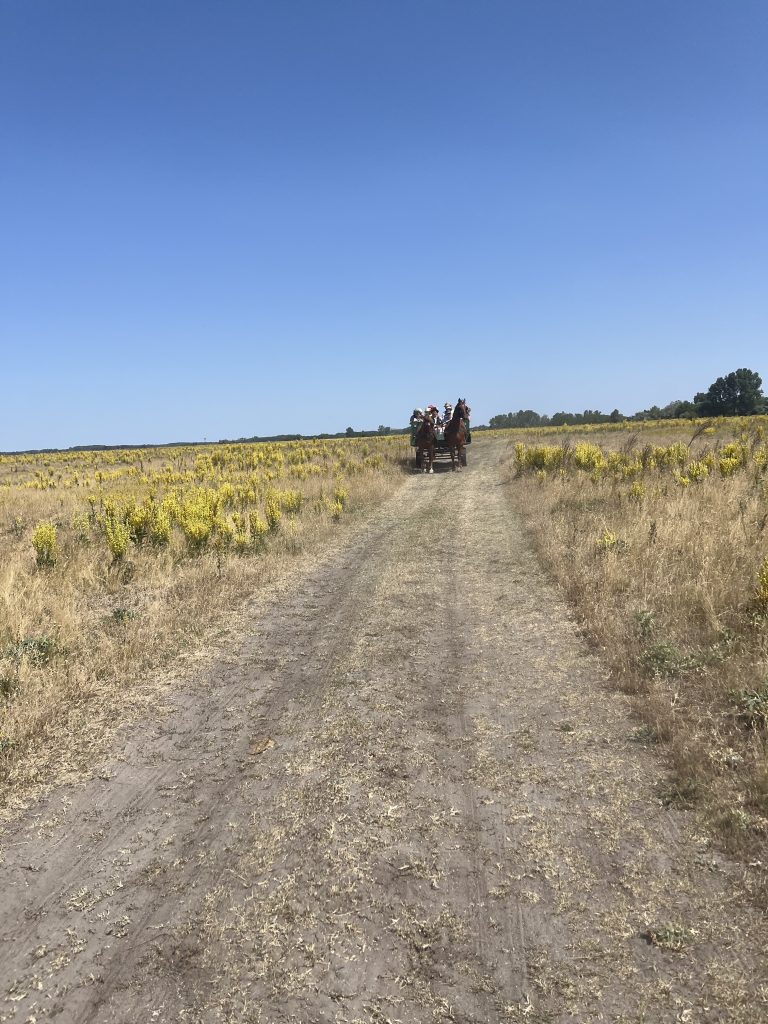
Tim and Janet’s Tanya is a beautiful blend of traditional Hungarian charm – primarily the thatch roof – and some Austrian influence. Thatch roofs are one of the main aspects of Tanya’s. In this region, there’s only one group of older men who still know how to repair these roofs. They’ve been working together for 30+ years, only speak Hungarian, and will down a whole plate of cookies within 5 minutes. On the property there’s also a pool, a garden, solar panels, and even a wine cellar. I had my own small guesthouse (!) to myself, separate from the main house, and the welcome was wonderful: wine on the patio while we dove headfirst into political conversations (my favorite). We talked about Dutch multiparty chaos (36 parties and counting…everyone has a say, including ultra-white Christian nationalists who don’t believe in women’s rights), and how the U.S. looks from an outside perspective. Their motivation for hosting workaway volunteers? Living in such a remote area, they wanted to avoid becoming hermits. They wish to bring the world to them – and it works!
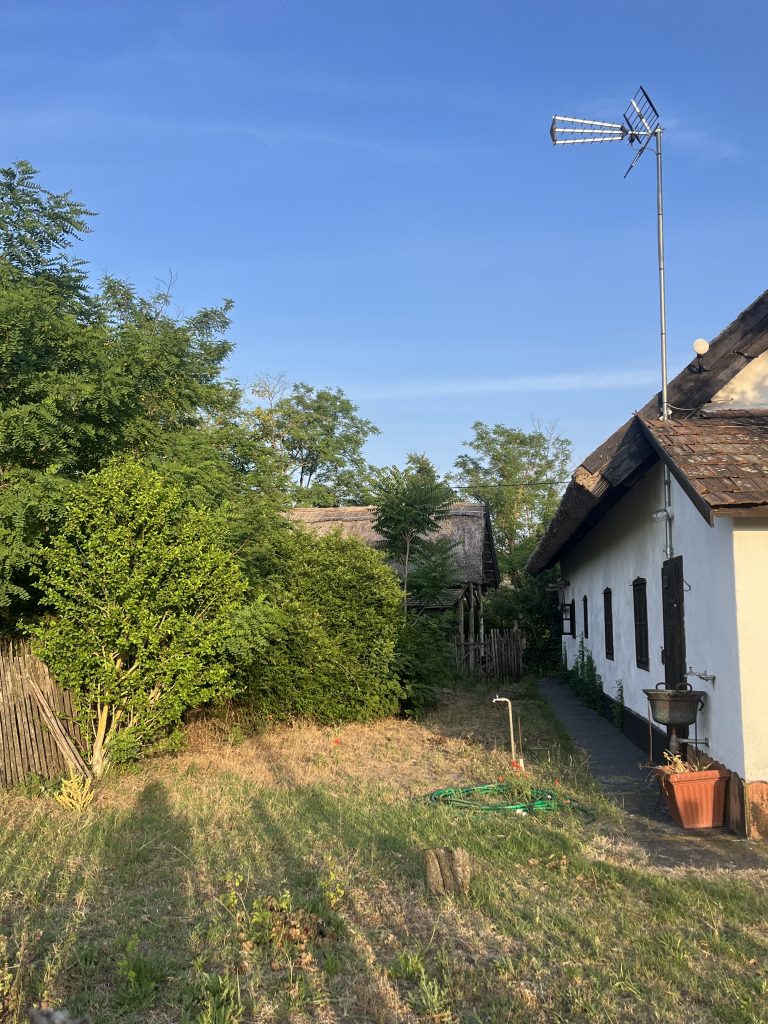
I had a lovely routine there. Days were spent helping in the garden, sanding and painting signs to place around the property, and scraping chalk paint off beams. In Hungary, the main beam of a house is considered its soul, and therefore deserves proper TLC. Chalk paint was the only paint readily available at the time previous owners were renovating, and it’s notoriously impossible to get off of wood. I would pick fresh mulberries from all of the trees on the property for lunch, and do some reading or writing. Sometimes I helped prep dinners, but mostly just enjoyed them, including a traditional Dutch dish of mashed potatoes with carrots, mustard, and bacon (for my non-Dutch friends, it is indeed better than it sounds). We visited a small ice cream shop called Fincsi Terasz. The owner works solo from 5am to 7pm every day (except for Sundays, where he starts at a comfortable 8:30am). We didn’t share a common language, as he didn’t speak English, but his kind smile was enough. The small businesses in Ruzsa are not like we would typically think they are. Ruzsa has everything anyone could need, except no business websites or social media pages, and no hours on the door. You have to know people and know where to find what you’re looking for.
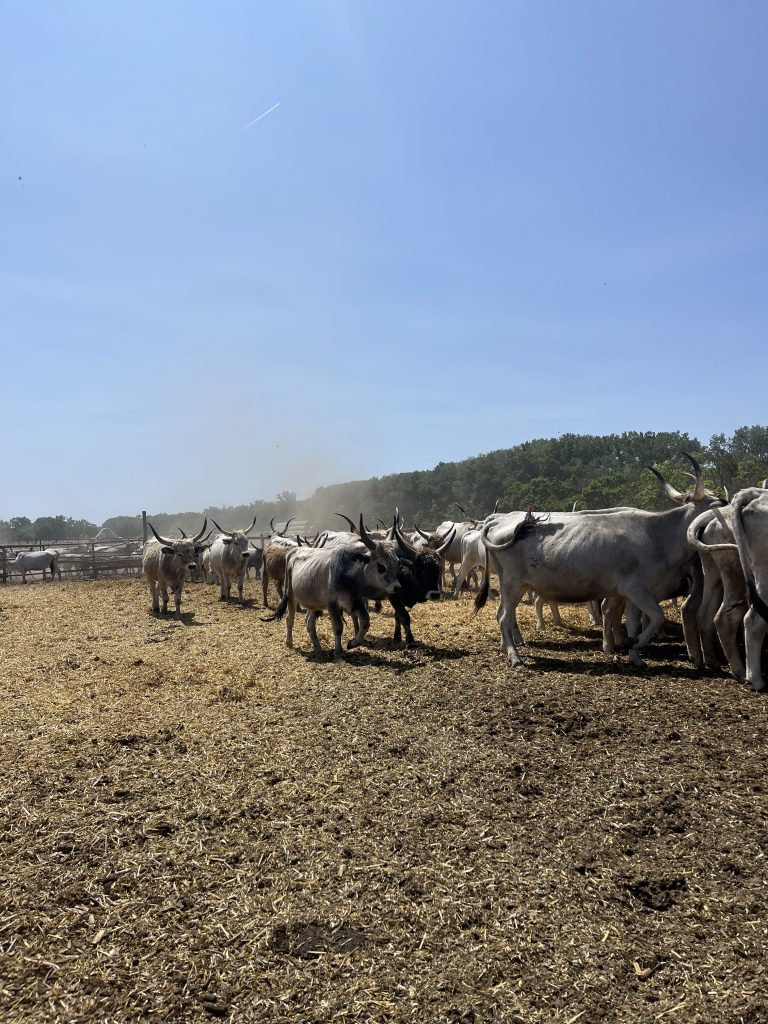
Life in the plains relies on bartering and trust. If a tree falls, the state won’t help you – you need a neighbor. And if you think your chimney is about to catch fire? Do not rely on the local fire department to get there at a reasonable time, because they will first ask you to meet them in town to show them the way, and then drive right past your property to check bushes at Homoki Lodge or something of that matter. I witnessed this firsthand. As Tim said, “If there’s ever a real fire, this place is toast.”
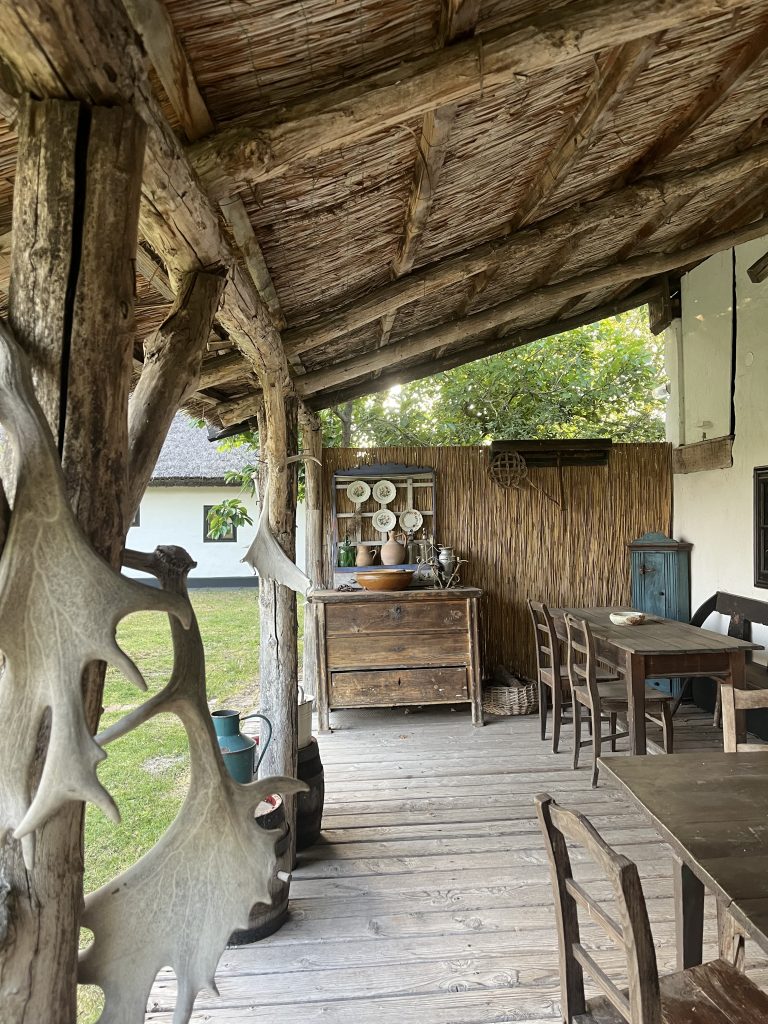
As for Homoki Lodge? Tim and Janet’s neighboring property. A lovely place, but a bit lonely. It’s such a gorgeous property – horse pasture, a beautiful pool, and even a circular riding range to ride horses while practicing archery. The owner is a retired architect, and designed/built most of it himself, and it shows. The place used to get lots of visitors from the UK, but since Brexit, less British are traveling to the EU. A lot of wealthier visitors would come from Budapest as well, but with the popularization of budget airlines, a lot of the old visitors are preferring to visit what they consider more interesting places (like Asia) rather than traveling to the Hungarian countryside for getaways. However, it is a wonderful resort-style ranch to relax your soul, and if you are ever in the area, I’d recommend you see it for yourself. Here’s a link: https://homokilodge.com/en/
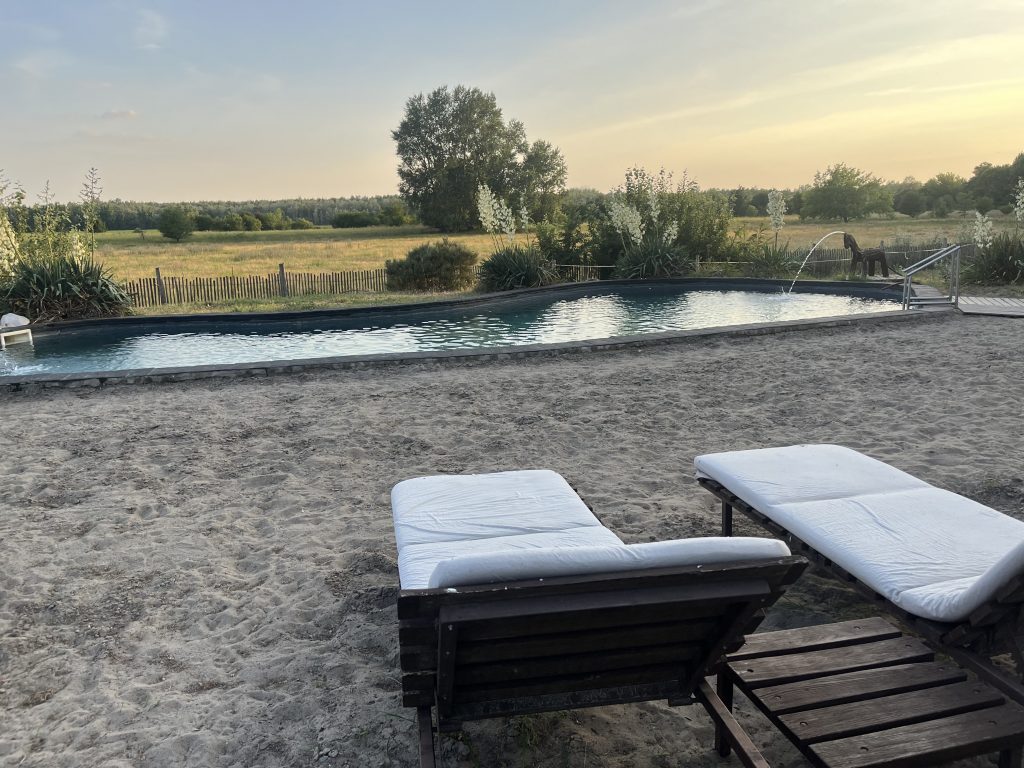
Life on the homestead continued in its lovely rhythm. I met the neighbors – the lead village hunter, and a Hungarian woman who runs a farm with local Mangalica pigs, geese, chickens, and a pregnant heritage cow (a major event in this farming community). Soon, Tim and Janet felt like family. I guess when you have no one else to rely on, you have to trust people in that way. We shared many stories and meals, and bonded over the occasional glass of wine or tequila shot (Tim knows every word of Gin & Juice, by the way).
My favorite event was when they took me to a traditional Hungarian horse show, almost getting a flat tire on the crazy sand roads and laughing as Janet yelled “Tim, you cannot kill our workaways!” right after he almost ran straight through a metal fence. The back roads are pure sand – southern Hungary used to be a desert, and even the trees there had to be planted. We took a carriage out to the riding range, and the show was surprisingly interesting – cattle herding, donkey tricks (for anyone who knows anything about donkeys, this is impressive), and even a game of musical chairs on horses. This, according to Janet, is the “most Hungarian countryside event you can experience”. Afterwards we had dinner, where the service was slow but the food was incredible, including the famous Mangalica pig. Slow service is a cultural difference between Europeans and Americans. In Europe, going out for a meal is generally considered a relaxed event, and nobody is rushed – including the restaurant workers.
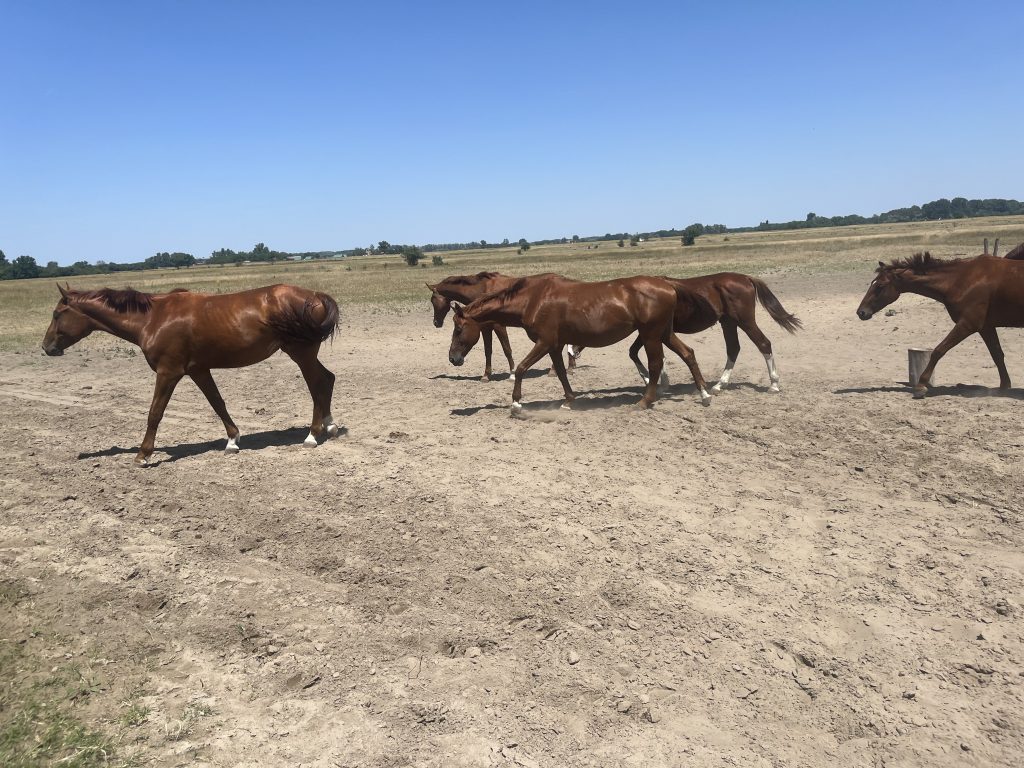
After two full weeks there, I made my way back to Budapest to board a bus for my next destination. But I was sad to leave. Within the first few days, this Tanya farmhouse felt like home. There is something profound about being somewhere so far and so different from your hometown, and having no choice but to trust those around you. There’s something to learn from bartering cow manure, seeing clear skies every night (and the occasional shooting star), and living without rushing or paying attention to the time. When I left, Tim and Janet told me I was welcome back anytime. I’d love to return, but if not, I will carry this place – and these people – with me always, as my first true home away from home.
Subscribe for post notifications!
Follow my Instagram @emmathibodeauu and my TikTok @stepsineverycorner for travel updates and dives into other topics.
***Use my promo code STEPSIN25 for WorldPackers membership discount!***

Leave a Reply